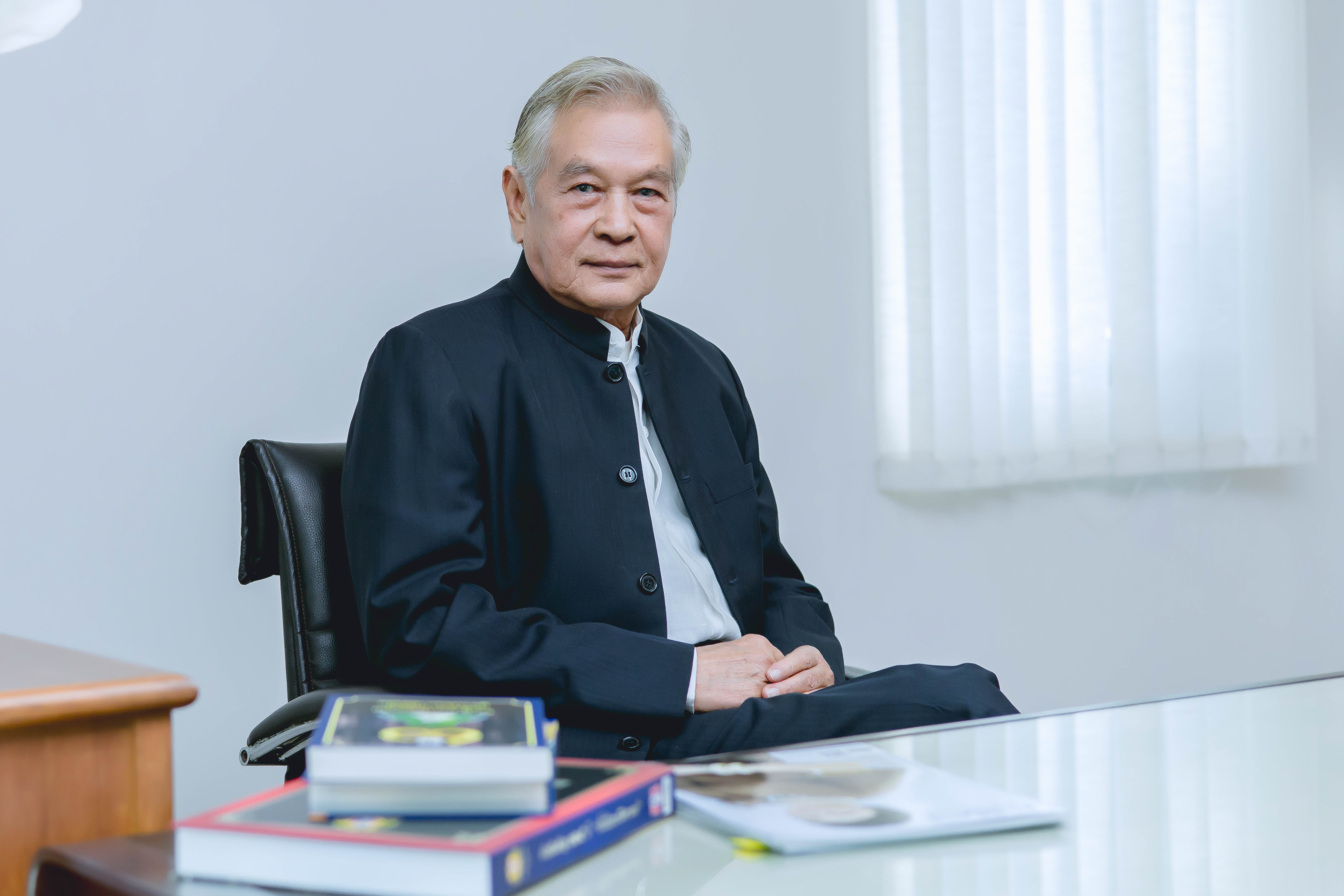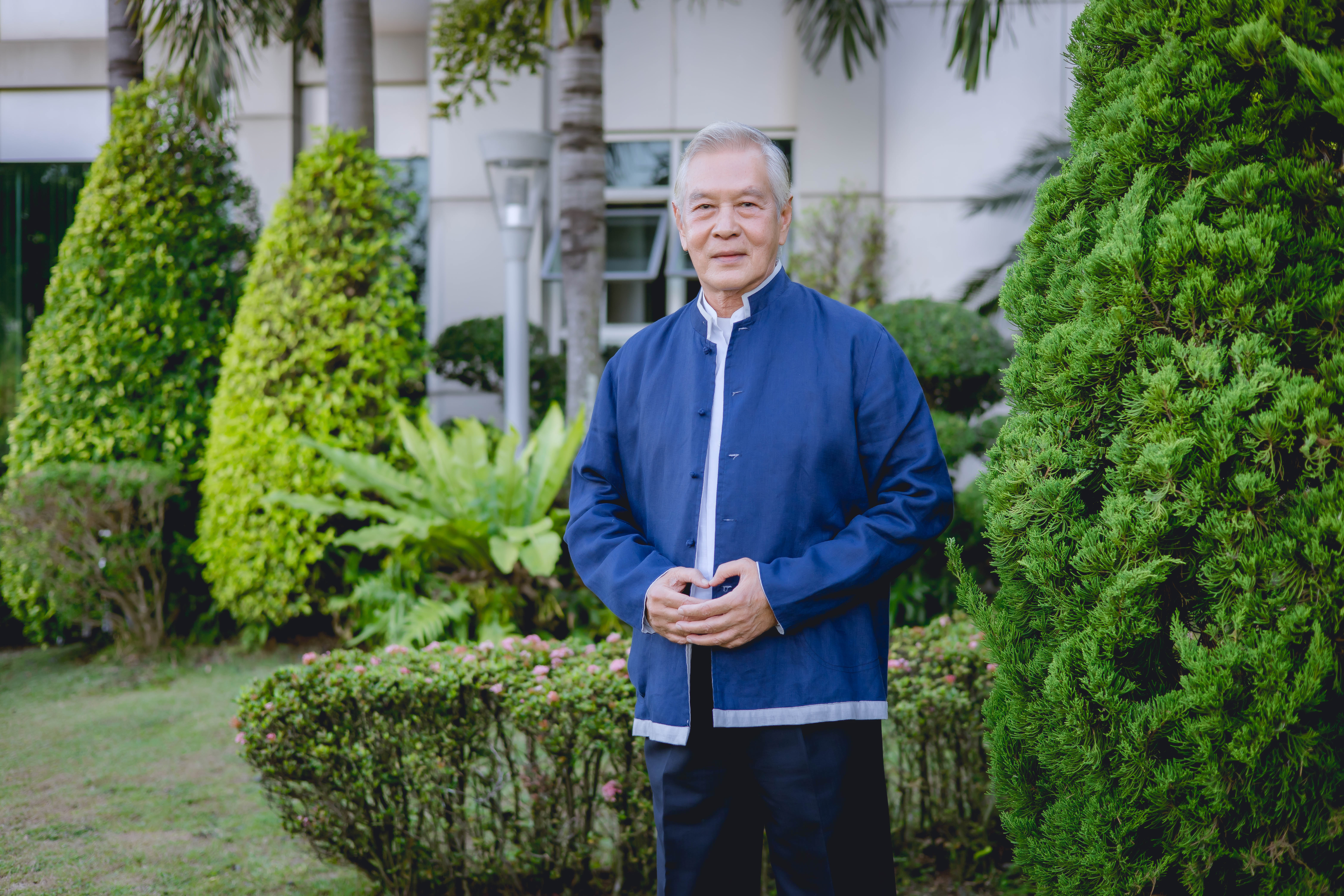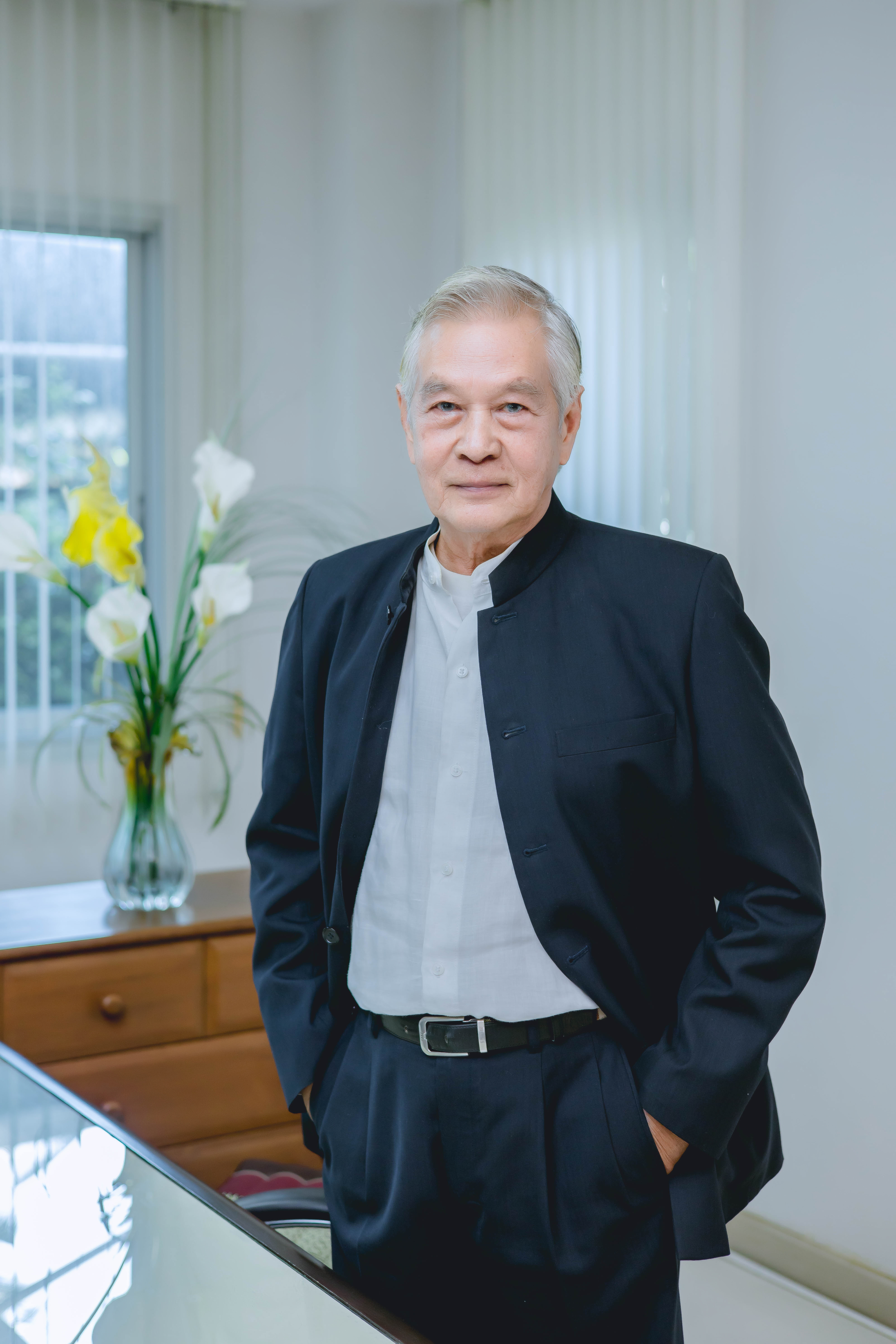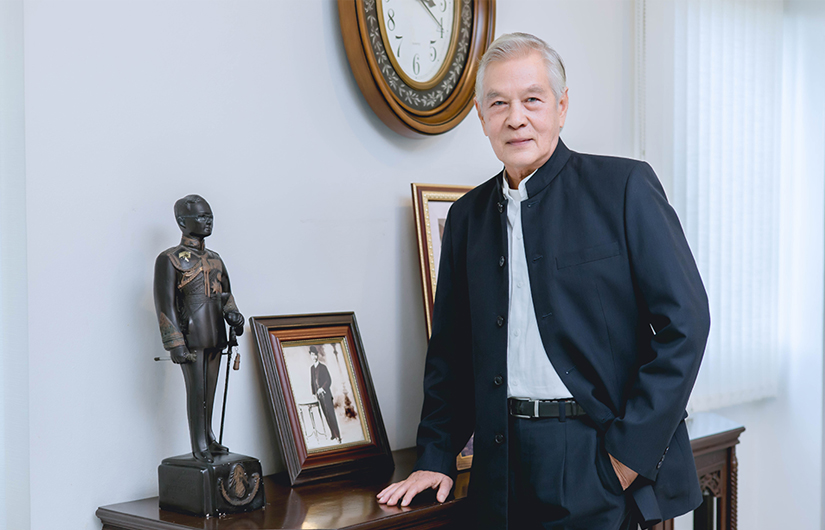Nirut Sirichanya, also known by his nickname Nhing, has been in involved in the Thai entertainment industry for about five decades.A very respected actor, he has also been a news anchor, game show host, reality TV programme judge and a presenter for advertisements and documentaries. But this was never what he planned to do, which is where we began our interview, he being kind enough to take time from his busy schedule to sit down with the Elite+ team.
To begin, can you tell us a little about your growing up and education?
When I grew up in Bangkok, the city was nowhere as developed as it is today. There was so much greenery and lush vegetation. I studied at Assumption College and when I graduated, I went to Australia to continue my studies and after that to Kuala Lumpur where after earning my degree, I returned to Bangkok to work. As a child, like many kids, I thought I wanted to be a policeman or soldier, but my parents were opposed to these ideas. I then thought I would like to work in the hospitality or airline industries. I never at this time thought about becoming an actor. And then when I did begin my work, it was for an engineering firm. I can’t say I liked the work, but I did enjoy being out of the office and on site. I’ve always loved being out of doors and in natural surroundings. Still, the job became boring, and I decided to quit.
What did you do next?
As I said earlier, I was interested in the hospitality industry. I thought it would give me a good chance to meet people. So, I got a job at a hotel and, over time, worked in virtually every department, customer service, reception and eventually as the night manager. However, I again became bored with the routine. Maybe that’s why I moved from department to department, but it just wasn’t what I imagined. So, finally, I left and turned my attention to the airline industry and got a job with Cathay Pacific. I got to travel some, which I have always enjoyed. While working in customer service and then sales, they would send me for training in Hong Kong. I also liked meeting new people through my training and work, but I still felt there was something missing.
That’s when I was approached about acting in a television drama. At first, I refused. I wasn’t attracted to this profession at all. Finally, though, after much coaxing, I took a job. But I didn’t like the work. I didn’t like being couped up and all the waiting around. So, after the one drama, I said no more.
I had earlier been approached by Alitalia, and then decided to see how it would be working for another airline, and as a European carrier, there would be more chances to travel and further abroad. I enjoyed the work. It was challenging, and I didn’t think at all about acting. But then a friend offered me work in a movie, telling me it was quite different than working on a television drama. So, I accepted, but said only if I could work just Friday evenings and on the weekends. I did not want to give up my job with Alitalia. So, this is what I did, worked two jobs. I liked the way film production operated. We shot a scene and then quickly moved on to another. So, I didn’t feel couped up. We were out a lot of the time in beautiful settings. In fact, it’s how I found the property for my Chanthaburi home. And so this is what I did for a while, until it became too exhausting. It was then I decided to pursue a career in the entertainment field. You’ve now worked in both Thai and foreign productions, can you tell us how the work compares? For me, personally, as an actor, my work isn’t so different. I listen to my director and follow their instructions. If they are good and can clearly explain what they want, my work is easy. The biggest difference I see between foreign and Thai filmmaking is the role of the director and the others on a film set. In foreign-made films, the director solely focuses on the actors. They leave the other jobs, or responsibilities, to the experts they have hired, like the producers, the heads of cinematography, lighting and sound as well as the production designer. The director can trust that they know the best actions to take, and then the director just needs to make sure things are how they imagined them. But in Thai productions, the director has to oversee everything. They can’t just focus on their actors. It’s a much more arduous task.

You as an actor have played many different roles and have been able to succeed in the industry for as many as 50 years. What would you account to your success?
As I said, much can be attributed to good direction, and I have had a lot of good directors. I have also become an arduous, or you can say dedicated observer of people, both good and bad. I watch and study people all the time. I also follow the news. Everyone works to control their appearance, you could even say their brand image and reputation. Do something society objects to, and you might never work again in the industry.
Here, as in many places, uniforms are important. And, yes, of course, the formal uniforms like for the police and military as well as civil servants, but also the grooming and fashion a person adopts. They distinguish where a person fits into society, and this can also help me to develop a character I’m playing. With any uniform comes expectations and responsibilities, and as we are seeing right now, there are those wearing these different clothes who are disappointing some members of the public while others feel these individuals are acting as expected.
What people wear communicates who they are or supposed to be. I can take all this and use it when I prepare for and perform in a scene. Over the years, I’ve learned to play both the hero and the villain as well as a lover, father, grandfather. I’ve been able to adapt as I’ve gotten older while my techniques have become refined over time. Many young actors cannot do this. They cannot put on the uniforms, or costumes, of different characters and play the part in a way that communicates with the audience. In real life, however, not like in a drama, the actions people take will always have actual repercussions, not like in a drama, which is make believe.
Could you reiterate a little more on this?
Well, an obvious example would be the War between Russia and Ukraine. We have the soldiers in their uniforms fighting directly with one another and then we have the leaders and politicians in their civilian or military uniforms playing their roles. There are also Ukraine’s neighbours and Western allies who are involved. There has been and will continue to be massive destruction. There have been enormous costs in lives and materials. Who is and will be paying for all this? Who is in the right? Well, that depends on which side you’re on. In truth, I don’t see how anyone can come out a winner.
It all reverts back to the economic ramifications. The petroleum companies have earned windfall profits, but the populace is suffering from higher fuel costs and inflation as the war has affected supply and demand, leading to higher inflation. Then, look how the UK has been suffering because of Brexit. They wanted their sovereignty, which they got back, but now prices have risen up and the National Health Service medical personnel are striking; imports and exports are also down, none of this is how the politicians pushing for Brexit described it. But you have to ask the Brits whether it was worth it. I’m only an observer.

Are these world events part of what has drawn you to live in the countryside, in Chiang Mai and Chanthaburi?
Since a young boy, I have loved to be in and with nature and, thus, you could say, “far from the madding crowd”. It’s soothing. It’s where I can recharge. Thus, it’s good for both my physical and mental health.
You, we know, are a proponent of organic gardening. Can you tell us about this?
In Chanthaburi, I have a large piece of property, where I began growing a lot of different kinds of fruit, durian, mangosteen, rambutan, longan, lychee, even strawberries and more. At first I used chemical fertilisers and pesticides. But then realised they were dangerous for both me and my workers and You know, I don’t have children of my own, but I do think of my trees as my children. I continue to plant and replace trees, especially the fruit as they age. Once planted, it takes about six or seven years until they mature and begin to bear fruit.
So, I care for them when they are young, and then when they are old enough they take care of me. Who could ask for me? those that consumed the fruit. The prices I could earn for most of what I sold could, I guess, cover most of my costs. So, then I turned to organic farming. Some of the pesticides I used were more costly, and while I tried to sell the fruit at high prices to cover these costs, most people were not really interested or ready to pay, and to survive, you need to have a market for your produce. People weren’t yet ready to pay more for the organic fruit. So, I decided to replant, or reforest my property, let it go completely natural.
The different fruit, especially like Salak, or snakeskin, has long grown wild in the surrounding rainforest in Chanthaburi, and durian, rambutan and mangosteen, grew wild in the jungles of Malaysia before being brought north. So, I kept the fruit trees I had and planted other species, like teak and mahogany, even sataw, the stinky, bitter bean found in the south as well as a wide variety of flora.
Now, I don’t have to invest in any fertilisers or pesticides. I don’t need to pay the costs of diesel fuel or electricity to pump water. I’ve let the property return to its former natural self. The birds have returned. I’m greeted by their chirps and signing every morning. From my home on a hilltop, I can look out at the nearby natural park reserve as well as my once more lush, reforested land. The air is usually clear. We don’t suffer from the burning, smog and pollution, like they do in the north. Don’t get me wrong, I also love the mountain air of Thailand’s north as well as the community of friends I have there.
My home in Chanthaburi is much more isolated, but also more convenient in many ways. The market is just about 15 minutes away where I can get fresh produce and other foodstuff to supplement what we grow as I have a great vegetable and herbal garden.
When I first settled there, I had to build my own road in to my property, After many, many years, they installed electricity. Many said that would be the ruin of this sanctuary as I look at this home. But that hasn’t been true as long as I have been selective as to what I install for our comfort and convenience. Over the years, they have also paved most of the road in from the highway, which has also made things easier as, in the past, the rains could turn the dirt, then gravel roadway into thick mud. I was very fortunate to have my Chanthaburi home during Covid. I had all I needed and could remain isolated and safe.
You know, I don’t have children of my own, but I do think of my trees as my children. I continue to plant and replace trees, especially the fruit as they age. Once planted, it takes about six or seven years until they mature and begin to bear fruit. So, I care for them when they are young, and then when they are old enough they take care of me. Who could ask for me?

Any final thoughts you would like to leave with our readers?
Well, when you asked if I am a proponent of organic gardening, I have to say I’m more a proponent of living with nature, of being one element in this ecosystem, helping to find and I guess promoting finding and enjoying the right balance in life.





















































































































































































































































































































































































































































































































































































































































































































































































































